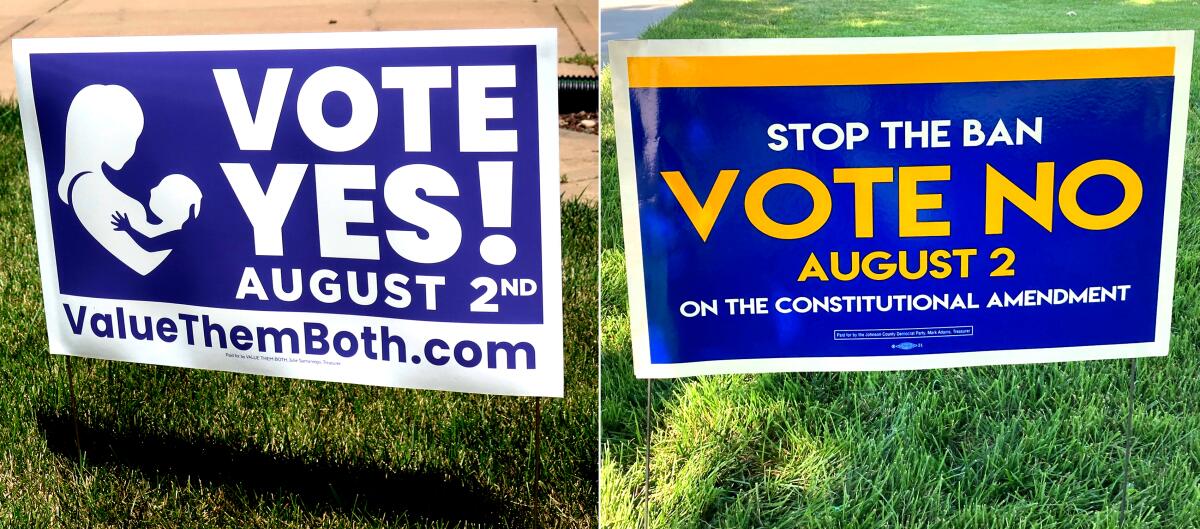Op-Ed: Roe’s gone, but the abortion wars just keep escalating

Yard signs for and against the Kansas ballot measure that would amend the state Constitution so that legislators could further restrict or ban abortion.
Next week, Kansans go to the polls for what will be the first vote on abortion since the Dobbs decision.
Abortion is legal in Kansas because the state Supreme Court ruled in 2019 that the Kansas Constitution protects every person’s right to personal autonomy, including the decision to terminate a pregnancy. The antiabortion Republican legislature sent the issue to voters in the primary election, when turnout is usually low and voters are more conservative than in general elections. The vote could amend the Kansas Constitution and open the door to a ban that would affect people across a region where abortion access is already a struggle.
We are just beginning to see the ripple effects of the U.S. Supreme Court’s decision in Dobbs vs. Jackson Women’s Health Organization, which eliminated a federal right to choose abortion. So far this much is clear: Dobbs will deepen our national divide on abortion for years to come. And the erasure of a right — an aberration in our constitutional tradition — has already begun to have sweeping and chaotic consequences.
Some of the many existing abortion bans on the books — 13 trigger laws and others revived from the pre-Roe era — have been tied up in court, where supporters of rights argue that the laws violate state constitutions or are simply too vague for anyone to understand. Ultimately, it’s expected that about half the states will further limit or ban abortion access.
Where criminality is involved in the various laws, doctors and their pregnant patients are facing dangerous uncertainties. All 13 trigger laws allow for an exception when a pregnant person could die or face the “substantial and irreversible impairment of a major bodily function” if they do not terminate a pregnancy. But patients may suffer complications that do not clearly qualify — such as water breaking prematurely or incomplete miscarriage. Doctors are unsure how close to death patients must be before they can intervene.
And the scope of emergency exceptions has kicked off what is sure to be the first of many fights between states and the federal government. The Biden administration has staked out the position that if abortion bans do not have an exception for the life or health of a pregnant person, or if the exception is drawn more narrowly than in federal law, an existing statute, the Emergency Medical Treatment and Labor Act, takes precedence and requires patient access to abortion. Texas has already filed suit, arguing that the statute does not guarantee patients access to care, and that after Dobbs, even in cases of life and death, abortion access must be left entirely to the states.
There will almost certainly be conflicts between states too. Progressive states are taking steps to shield doctors and others who assist out-of-state abortion seekers from extradition, civil lawsuits and other consequences. In conservative states, meanwhile, proposed bills would prohibit residents from crossing state lines for abortions, or would criminalize abortion beyond state borders — potentially ensnaring doctors in states like California, where abortion is legal and protected.
Some of these strategies rely on the playbook formulated in the fight over Texas’s Senate Bill 8, which allows private citizens to sue anyone who performs an abortion or assists someone seeking one, an enforcement scheme that makes it hard to challenge even a clearly unconstitutional law in court. Conservative lawmakers may try to apply the same mechanism to legislation that would violate the federal right to travel.
Even businesses may get swept in to enforcement battles: South Dakota and Texas have vowed to bar companies from doing business in their states if they reimburse employee travel for abortion — and to prosecute individual CEOs who endorse such practices.
State constitutions are also up for grabs. In addition to Kansas, constitutional-amendment ballot measures related to abortion rights have been certified in California, Vermont and Kentucky, and Michigan and Colorado have measures pending. And that’s just the 2022 ballot. Three of the current measures (in California, Vermont, Michigan) seek to affirm a right to abortion; the others would ban abortion or pave the way for such bans. The outcome of these struggles is hard to predict — polls show that even conservative voters may not favor constitutional bans, no matter how much they prefer to elect Republicans.
The U.S. Supreme Court, by allowing states to go their own way on reproductive rights, has multiplied the battlefields in the abortion wars and created tremendous uncertainty for pregnant people and those who love them. Overturning Roe vs. Wade has exposed the extent to which both supporters and opponents of abortion see their cause as one on which compromise is impossible.
The Dobbs decision implies that the solution to our abortion fight was simple — let each state and its voters decide for themselves. But in many states, lawmakers are pushing bills with no exceptions for rape, incest, health or even the life of a pregnant person, no matter what voters think. And with the power of the polls diminished by gerrymandering, voter suppression and partisan attacks on elections, the idea that outcomes reflect the will of the majority is more than a little disingenuous.
Nonetheless, if there’s good news in the past month of chaos, complications and danger for many pregnant Americans, it’s that the option to fight remains. Dobbs is not the end of the story when it comes to reproductive rights in America, and we can still have some say in what happens next.
Mary Ziegler is a professor at the UC Davis School of Law and the author, most recently, of “Dollars for Life: The Anti-Abortion Movement and the Fall of the Republican Establishment.”
A cure for the common opinion
Get thought-provoking perspectives with our weekly newsletter.
You may occasionally receive promotional content from the Los Angeles Times.



